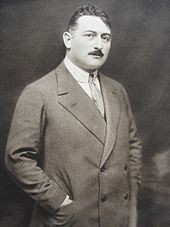Jean Gilbert
Jean Gilbert (born February 11, 1879 in Hamburg , † December 20, 1942 in Buenos Aires ; actually Max Winterfeld ) was a German composer and conductor .
Life
Jean Gilbert grew up in a Hamburg family in which almost all of the male members were singers, actors or musicians. His uncle Bernhard Dessau was concert master of the Kgl. Prussian court orchestra , the composer Paul Dessau was his cousin. The artistic relatives encouraged the young Jean Gilbert's early inclination to music.
After several years of study, including with Philipp Scharwenka in Berlin, who gave him lessons in composition , he performed as a piano virtuoso at the age of 15, but after a short time he was drawn to the theater. At the age of 18 he became Kapellmeister in Bremerhaven. He then moved to the Carl-Schultze-Theater in Hamburg and, at the age of 20, as the successor to Leo Fall at the Central Hall in Hamburg to the director Ernst Drucker . He had him compose an operetta based on a French subject ( Das Jungfernstift ). This resulted in the name change to Jean Gilbert. At the age of 21 he married a woman from Hamburg, at the same time he was doing his military service.
After a position as Kapellmeister at the Apollo Theater in Berlin , where he conducted operettas by Paul Lincke , he undertook a major tour as a concert conductor through Germany, Italy, France and Scandinavia. In 1908 he went to Düsseldorf and began composing for the stage again. In 1909 his Vaudeville Posse Polish Economy came out in Cottbus . In 1910 he settled in Berlin. His best-known operetta is Die chaste Susanne (1910), his best-known song Puppchen, du bist mein Augenstern (1912) from the three-act farce with song and dance Puppchen . In 1913 he was contracted for a short time by the film production company Literaria Film .
As a Jew he emigrated in 1933, first to Madrid, then via Paris in 1939 to Argentina. There he led the orchestra of the radio station LR 1 Radio El Mundo .
His son Robert Gilbert was also a composer and writer of song texts ( Im Weiße Rößl ) . He was also known as a German translator and editor (including the musicals Can-Can , My Fair Lady , Hallo, Dolly! And Cabaret ).
Another son was the children's and youth author Henry Winterfeld .
In Hamburg-Altona , Gilbertstrasse has been named after him since 1948, previously called Gustavstrasse.
Works (selection)
- Car lover. Musical farce.
- Blondinchen. Musical farce.
- The bride of Lucullus. Operetta in three acts.
- The lady with the rainbow. Operetta in three acts (7 images).
- The can of Sr. Majesty. Operetta in three parts.
- Hotel city of Lviv. Musical drama in three acts and an episode.
- The maiden pen.
- The chaste Susanne . Operetta in 3 acts, 1910, Magdeburg.
- The cinema queen. Operetta.
- The life artist. Burlesque opera in three acts.
- Polish economy . Vaudeville Posse in three acts.
- Puppet. Musical farce.
- Travel around the world in 40 days. Revue.
- The tango princess. Posse.
- The woman in the ermine. Operetta in three acts.
- Katja, the dancer. Operetta in three acts, 1923, Vienna.
- The juggler king. Operetta, 1923
- The lady with the rainbow. Operetta, 1933.
literature
- Ernst Waeltner: Gilbert, Jean. In: New German Biography (NDB). Volume 6, Duncker & Humblot, Berlin 1964, ISBN 3-428-00187-7 , p. 391 ( digitized version ).
Web links
- Literature by and about Jean Gilbert in the catalog of the German National Library
- Biography, works, literature , lexicon of persecuted musicians from the Nazi era
- List of stage works by Jean Gilbert based on the MGG at Operone
- Sheet music and audio files by Jean Gilbert in the International Music Score Library Project
- Jean Gilbert , biography in the portal lexm.uni-hamburg.de
- Jean Gilbert Collection in the archive of the Academy of Arts, Berlin
Individual evidence
- ↑ Light games. The cinema in Germany until 1914, Herbert Birett, page XXXV, Q-Verlag Munich, 1994
| personal data | |
|---|---|
| SURNAME | Gilbert, Jean |
| ALTERNATIVE NAMES | Winterfeld, Max (maiden name) |
| BRIEF DESCRIPTION | composer |
| DATE OF BIRTH | February 11, 1879 |
| PLACE OF BIRTH | Hamburg |
| DATE OF DEATH | December 20, 1942 |
| Place of death | Buenos Aires |
